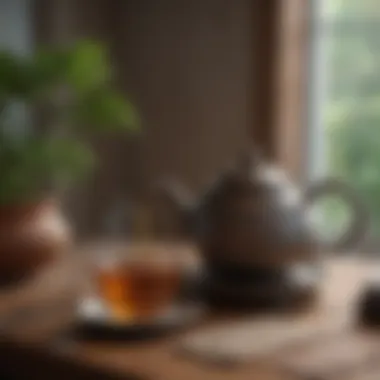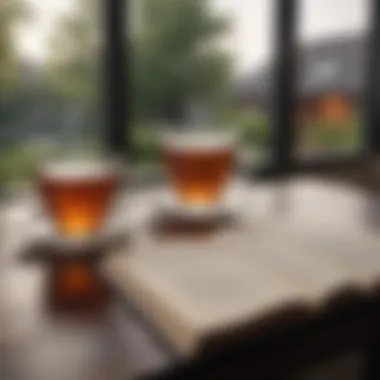Discover the Best Teas for Relaxation and Clarity


Intro
Exploring relaxation through tea is not simply about the beverage itself, but it involves understanding its connections to mental clarity and overall well-being. Tea has been a part of human culture for centuries, cherished not only for its flavor but also for its ability to promote calmness and focus.
In this article, we aim to dissect the myriad of tea types known for their soothing properties, while also provide insight into their psychological and physiological impacts. This knowledge serves not only to enhance one’s tea-drinking experience but also to equip individuals with effective tools for managing stress and improving mental clarity.
Understanding Mental Health and Well-being
To fully appreciate the benefits tea brings, it is crucial to comprehend the nuances of mental health.
What is Mental Health?
Mental health encompasses emotional, psychological, and social well-being. It affects how individuals think, feel, and act. Factors influencing mental health include genetics, environment, and life experiences.
The Importance of Prioritizing Mental Well-being
Prioritizing mental well-being is not just an option; it's necessary for leading a balanced life. Good mental health fosters resilience and enhances productivity. A clear mind can improve relationships, job performance, and overall quality of life.
Common Mental Health Challenges and Disorders
Many individuals wrestle with mental health challenges. Among the common difficulties one can face are:
- Anxiety Disorders
- Depression
- Bipolar Disorder
- Obsessive-Compulsive Disorder
Recognizing these conditions is essential in progress towards better mental health.
Strategies for Improving Mental Health
To enhance mental health, integrating specific strategies can be impactful.
Self-care Techniques and Practices
Self-care is crucial. Investing time in activities like reading, journaling, and tea rituals can greatly enhance personal wellness. Adding tea thoughts to self-reflective practices further establishes a space of tranquility.
Building Resilience and Stress Management
Developing resilience and effective stress-management techniques can fortify your mental health framework. Practices such as yoga, deep breathing, or mindfulness meditation might work synergistically with tea consumption.
Seeking Professional Help: Therapy and Counseling
Sometimes professional help is needed. Therapists and counselors can provide invaluable support. Remember, reaching out may lead to profound insights into managing mental burdens.
Finding Balance in Life
Achieving balance necessitates holistic focus on many areas contributing to mental health.
Healthy Lifestyle Choices: Diet, Exercise, and Sleep
Maintaining a balanced diet, engaging in regular exercise, and ensuring proper sleep are foundational elements to support mental clarity. Fall back to tea as a complementary strategy that aligns well.
Mindfulness and Meditation Practices
Incorporating mindfulness into daily life sharpens focus and reduces anxiety.
Setting Boundaries and Managing Time Effectively
Finally, setting boundaries in both personal and professional contexts aids in relieving stress. Evaluating time spent on various tasks might reveal a need for change.
Enhancing Personal Development
Personal development is deeply intertwined with improving mental well-being.
Goal Setting and Productivity Tips
Setting realistic goals allows individuals to measure progress. Effective productivity techniques can contribute to reducing feelings of overwhelm.


Building Healthy Relationships and Social Connections
Strong social connections can offer invaluable support parameters, reducing the burden significantly.
Practicing Gratitude and Positivity
Cultivating gratitude enhances overall outlook on life. Simple practices like maintaining a gratitude journal can instill a sense of fulfillment.
Tips for Maintaining Mental Well-being
As we move further into our daily lives, reinforcing habits for sustained mental health becomes paramount.
Strategies for Preventing Burnout
Recognizing early signs of fatigue can prevent full-fledged burnout. Tea can serve as a brief retreat from challenges.
Coping with Challenges and Setbacks
When facing setbacks, retaining perspective is key, as it is vital to differentiate between setbacks and failures.
Creating a Supportive Environment
Environmental factors greatly impact mental health. Crafting an encouraging environment filled with resources and supportive individuals can act as flying assistance on tougher days.
"Mental clarity can be significantly enhanced with simple changes to your routines, including mindful tea consumption."
Both the wisdom captured here and explicit exploration of tea's role lays groundwork for empowered decisions around mental health and clarity.
Prelims to Tea as a Relaxation Aid
The role of tea in relaxation offers a profound subject worth exploration. Across diverse cultures, tea acts not just as a beverage but also as an instrument for calming the mind and body. This article seeks to illuminate the various ways tea can foster relaxation, focusing on specific elements and benefits that support mental clarity.
Incorporating tea into one’s routine can lead to noticeable shifts in mood and well-being. The experience of preparing, brewing, and sipping tea fosters a moment of stillness, dispelling daily stresses. Moreover, the unique composition of various teas holds the potential to aid in stress reduction, offering both physiological and psychological benefits.
Cultural Perspectives on Tea and Relaxation
Tea's long history is rich with cultural traditions emphasizing relaxation. In countries like Japan and China, tea ceremonies are revered as holistic experiences that extend well beyond the act of drinking. These practices invite participants to focus on the present moment, creating a deep connection with the tea itself and with one another.
Similarly, in England, the afternoon tea ritual exemplifies how tea serves as a social balm. This tradition promotes not just relaxation but also community ties. Each culture brings its distinct flavors and philosophies that enhance the experience of mindfulness through tea consumption, resulting in a universally acknowledged tool for reducing stress.
Scientific Interest in Tea and Stress Reduction
Recent studies increasingly showcase tea's potential as an aid for stress reduction. Various compounds present in tea, particularly catechins and L-theanine, have been studied for their calming effects. Research demonstrates that these components influence brain function, contributing to improved mood and clarity of thought.
For instance, green tea is noted for its rich composition of epigallocatechin gallate, a potent antioxidant. In scientific literature, many articles suggest that this may help to alleviate anxiety and create a sense of calm. Furthermore, an regular intake of chamomile tea, long known for its soothing properties, can also yield beneficial outcomes such as decreased emotional distress. As scientific inquiries continue, the findings demonstrate a growing acceptance and recognition of tea's significant role in supporting mental health and relaxation.
“Tea is to the body as music is to the soul.”
In summary, tea possesses cultural significance along with scientifically backed health benefits. Understanding these dimensions not only emphasizes its role as a relaxing aid but also encourages individuals to integrate it into their lives more consciously. Recognizing these elements can empower personal choices about wellness and mental clarity, shaping effective coping strategies for everyday challenges.
Understanding the Ingredients in Tea
Understanding the ingredients in tea is crucial for maximizing its relaxation benefits. Different teas contain varying combinations of elements that influence both mental clarity and relaxation levels. By recognizing how these components interact in the body, individuals can select the most supportive options for their health and well-being. The essential ingredients include caffeine, amino acids, polyphenols, and other biochemical compounds. Each of these has potential effects on relaxation, alertness, and overall mood.
Caffeine Levels and Their Impact
Caffeine is a central ingredient in many tea types. It is well-known for its stimulating properties, but its impact on relaxation is nuanced. In moderation, caffeine can help improve focus and mental agility. However, excessive consumption can lead to increased anxiety or jitters, undermining the desired calming effects of tea. It is important to understand which teas offer lower or higher caffeine levels and how these might affect individual responses. For instance, black tea and green tea generally contain more caffeine than herbal teas like chamomile. Therefore, individuals seeking to incress mental clarity without overstimulation may prefer opt for teas that are naturally lower in caffeine.
"Selecting the right tea can help an individual strike a balance between alertness and relaxation." - Caffeine sensitive individuals should be more cautious.
In practical terms, it can help to prepare tea with loose leaves rather than bags. This allows for better infusion control of both flavor and caffeine content. Additionally, monitoring consumption time, drinking primarily in the morning or early afternoon, can mitigate any potential counterproductive effects on sleep at night.
Amino Acids, Polyphenols, and Other Compounds
A lesser-known but significant component of tea includes amino acids, particularly L-theanine. This amino acid is found predominantly in green tea. It is known to promote relaxation without drowsiness. Its can counter some effects of caffeine, helping to induce a state of calmness while maintaining focus. Studies suggest that L-theanine can enhance brain function by encouraging alpha waves in the brain.
Polyphenols, such as catechins, are another interesting element in tea. They harbor antioxidant properties that contribute to overall health and well-being. Research shows that these compounds can influence stress response in the body. This quality can enhance tea's role as a relaxing drink. It is not solely about taste, but rather their potential calming effects become increasingly relevant.


Other compounds found in tea such as flavonoids and essential oils can also contribute to the overall relaxation and enjoyment during the tea-drinking experience. Each ingredient brings unique properties, potentially influencing how tea aids not just relaxation but also general mental health. By diving deeper into these properties, consumers can make informed choices regarding their tea selections based upon personal preferences and needs.
Identifying Key Relaxing Teas
Teas can offer not only taste but also significant factors for mental clarity and relaxation. Identifying specific types of relaxing teas adds valuable insights for anyone aiming to reduce anxiety and improve mental health. In this section, we will outline essential teas that have become well-regarded for their calming properties. Understanding these teas can guide one's choice to strengthen a daily routine focused on wellbeing. By focusing on both traditional and herbal options, one may easily integrate them into everyday life and find methods for better stress management.
Chamomile Tea: A Traditional Choice
Origins of Chamomile
Chamomile has rich history steeped in cultures around the globe. Often tied to ancient Egyptian rituals, this plant introduced various medicinal usages as far back as 1550 BC. The flowers, a key component, are harvested for their soothing properties. Chamomile became popular due to its reputation for induceing calmness. Many people prefer chamomile for its long-standing tradition and proven effects on relaxation. Its bendable nature makes it an ideal candidate for various tea drinks.
Health Benefits
The health advantages of chamomile tea are plentiful. Primarily, research has indicated its effectiveness against anxiety and insomnia, promoting overall mental well-being. Chamomile contains antioxidants that battles inflammation and reduces levels of stress hormones. This results in an increased personal sense of calm. Its broadly appealing profile contributes to its attraction as a relaxing choice supported actively by its evolving anecdotal evidence in wellness circles.
Brewing Tips
To reap the best effects from chamomile, subtleties in brewing can determine its efficacy. A water temperature of about 200°F is optimal, with an infusion time of 5-10 minutes. Choosing quality is vital, whether opting for loose leaves or tea bags. Straining fresh herbs brings nuanced flavors forward, enhancing the brewing experience. Consider drinking it before sleep or during a calm break.
Lavender Tea: A Fragrant Option
Effects of Lavender on Anxiety
Lavender tea has gained in popularity due to the notable calming effects on anxiety and stress. Studies suggest that inhaling or consuming lavender can help regulate emotions, promoting more relaxation. The active compounds like linalool provide stress-coping mechanisms. It's a beneficial choice for anyone looking for a fragrant companion in daily routines, particularly if preference leans toward helpful aromatherapy.
Preparation Methods
Preparing lavender tea should be simple. Start with dried lavender buds. Boil water and infuse the buds for about 10-15 minutes. Sifting gives clarity to the beverage. Variations methods achievable by switching to a cold brew can also provide a refreshing take during warmer months. Consider pressing a limb of fresh lavender to bring subtlety to preparation while holding onto fragrant notes.
Pairing with Other Ingredients
Lavender uniquely pairs well with other products like chamomile or lemon balm. The additional flavors blend harmoniously and enhance mental clarity. Fine-tuning flavor highlights effects relevant for interpersonal focus or recreational mindfulness. Experimenting with ratios can blend pleasant tastes while maintaining the relaxing benefits of lavender.
Valerian Root Tea: Strong Relaxation Support
Mechanisms of Valerian
Valerian root possesses particular mechanisms, elevating it as a sleep aid and relaxation support. Valerenic acid, a active compound in this tea plays an important role in functioning by affecting receptors linked with stress responses. This quality has accelerated its usability for treating insomnia and other sleep issues. For individuals struggling with anxiety, valerian becomes a seriously relevant option to consider.
Usage Guidelines
This tea generally serves well in dosing. Usually consumed in tincture or un-teabags, timing plays crucial part. Many find evening consumption optimal nearing bedtime. Caution is advisable with regulating individual drinks to avoid the potential groggy feel associated with valerian and other similar substances. Monitoring and adhering to acceptable limit works best.
Potential Side Effects
While the roots have properties acting in support of relaxation, slight side effects could arise. These may range from headaches to fatigue but are usually considered temporary. Each individual varies greatly, therefore understanding one's response matters. Reading up about its interaction with medications involving tranquillizers become necessity for adapting one's plan. Keep ideals pliable when experimenting with this variety.
Peppermint Tea: Soothing Digestion and Mind
Benefits Beyond Relaxation
Peppermint tea does more than relaxation. Its capability for easing indigestion makes it relevant beyond mere soothing. Reports indicate this infusion offers additional health edges—antioxidants improve immunity while eases common maladies like headaches. Moreover, the energizing nature uplifts spirit without caffeine dependence, which aligns with regular mental wellness undertakings. This versatility in focusing capacities makes peppermint thoughtaking an understanding choice for many seeking relaxation with practicality.
How to Prepare Peppermint Tea
Preparation varies simply based on dried peppermint or fresh leaves. Typical methods allow placing leaves into boiling water for about five minutes. Adjust steep time and leaf quantity to taste. For an even smoother experience, pureing the leaves can merge the beautiful essence along fluid comforts during post-meals or coping during stressful hours.
Creating a Relaxing Tea Ritual
Creating a tea ritual can greatly enhance the overall experience and effects that tea has on relaxation and mental clarity. Rituals allow individuals to form a habitual connection with tea, fostering moments of tranquility in daily life. A successful tea ritual not only incorporates the type of tea one enjoys but also engages the senses and encourages mindfulness.
Setting the Environment
Choosing the Right Space
Choosing the right space for your tea ritual can directly impact your ability to relax and mentally clear your mind. A peaceful environment allows one to focus, reducing distractions that could interrupt the calming process. Ideally, this area should be away from the hustle and bustle of daily routines.


A quiet corner in your home, like a well-lit nook by a window, signifying comfort and tranquility can be an ideal choice. Soft seating, pleasant decor, and natural light play crucial roles in creating an inviting atmosphere for your tea practice. Thus, establishing such an environment cultivates intentional focus and promotes a deeper relaxation experience.
Elemental Aspects to Consider
The elemental aspects of the ritual also bear significance. These include elements like light, color, and even nature sounds. For instance, dim lighting can create a calm atmosphere, while natural elements like plants can ground the space. Opting for soft colors in your decorating scheme can evoke a sense of peace.
Pay close attention to how these elements interact. Too much stimulation—such as loud noises or clutter—can be detrimental to the tranquility you seek. Simply put, balancing these factors can help forge a space that truly inspires calm without overwhelming the senses.
Timing and Frequency
Best Times to Drink Tea
Timing plays a crucial role in benefiting from tea's relaxing effects. While tea can be enjoyed at any moment, specific times can be especially rewarding. Evening tea is often suggested as a perfect period to unwind after a long day. The act of sipping tea on a quiet evening invites your mind to switch out of the hectic daytime mode, fostering peace and clarity before sleep.
Natural light conditions can also affect your choice of time. Many find that having tea in the morning cultivates a fresh start to the day, aligning benefits like mild caffeine with their routine.
Establishing a Routine
To foster a sustained impact from your tea ritual, establishing a routine is vital. Consistency encourages habit and reinforces the internal cues surrounding relaxation. Designating certain times each day to prepare, steep, and enjoy your tea creates structure.
Some may find early mornings or tranquil evenings suitable daily reminders to pause and reflect. Simple conflicts, whether emotional or physical, can thus be thoughtfully combated through tea connection and consumption. This habit does not only provide relaxation but can also lead to better utilization of mental clarity during your chosen time.
By understanding and acting on these elements of creating a tea ritual, individuals can enrich their experiences significantly. Consciously setting the stage before indulging teaches valuable lessons in patience and intentionality, ultimately offering both substantive momentary relief and long-term mental health benefits.
Potential Considerations and Precautions
Considering the various types of teas suitable for relaxation, it is vital to be aware of potential considerations and precautions. This awareness not only enhances the effectiveness of tea in promoting calmness but also safeguards individuals' overall health. Addressing personal tolerance and seeking professional advice can play a significant role.
Understanding Personal Tolerance
Each person's body reacts differently to the compounds in tea. Factors such as individual metabolism, existing health conditions, and co-consuming substances can influence one’s tolerance level. For example, certain teas contain caffeine, which can be a double-edged sword. While moderate amounts help improve concentration and mental clarity, excessive intake may lead to jitters or heightened anxiety.
Therefore, it's essential to start with small quantities, then observe how your body responds. Common symptoms people may encounter include:
- Restlessness if too much caffeine is consumed.
- Drowsiness from overly heavy doses of sedative herbs like valerian.
Maintaining awareness of your body is key. Adjust the amounts and types of tea according to specific reactions. Listen not just to the taste but also the signals your body sends during and after drinking.
Consulting Healthcare Professionals
Engaging in conversations with healthcare professionals is advised, especially if someone has existing health discrepancies or is pregnant. Certain herbal teas might interact with medications, possibly diminishing their efficacy or amplifying side effects. It might be valuable to consult with:
- General practitioners regarding health safety.
- Oncologists for individuals undergoing cancer treatment.
- Nutritionists for tailored advice concerning herbal blends.
Seeking professional advice ensures safety and tailored recommendations, which can lead to better outcomes in utilizing tea for relaxation.
Understanding these precautions allows readers to harness the benefits without exposing themselves to adverse effects.
The End: The Role of Tea in Mental Health
Tea consumption has significant relevance in mental health management. This article explored various types of tea known for their calming properties and benefits to mental clarity. By understanding how teas such as chamomile, lavender, and green tea can influence our emotional well-being, we offer readers a clearer understanding of tea's role in promoting relaxation. The connection between tea and mental health is not just anecdotal; scientific studies recognize the physiological and psychological impacts these brews can provide.
Integrating tea into daily life serves various purposes. A solid routine involving tea encourages mindfulness. This shifts focus from the chaos of daily life to a moment of pause, creating space for contemplation and restorative time. Suitable options can enhance other coping strategies, presenting alternative methods of stress management. Taking time to enjoy tea is not simply about sipping a warm beverage; it is a focus on wellness. Through consideration of flavors and rituals, tea drinking becomes a mindful experience that reinforces health.
"The experience of tea drinking is not solely based on the beverage but intricately intertwined with the environment and mindsets that dictate the practice."
Summary of Key Insights
This article sheds light on the following key insights:
- Research supports tea's calming influence: Variations of tea show properties that can help reduce stress and anxiety. Research suggests specific compounds in these teas play crucial roles.
- Types of tea for mental clarity: Different teas offer unique benefits. For instance, chamomile is well-known for soothing effects; peppermint aids in digestive comfort, elevating mental state.
- Establishing rituals enhances benefits: Adopting a regular time and process for tea drinking cultivates cognitive focus. Creating a peaceful environment fosters mindfulness.
- Personalization matters: Understanding individual responses to different teas allows for optimized experiences. This encourages listeners and practitioners to be proactive about standard choices.
Encouragement for Daily Rituals
Integrating tea rituals into daily life paves a smooth path toward improved overall health. One does not have to be austere. Simple acts are just as effective. Consider time alone for relaxation or pairing tea with other self-care activities.
Suggestions for daily tea rituals include:
- Morning Routine: Begin the day with green tea, which can help boost antioxidant levels while maintaining focus. Prior morning rituals can promote a smoother transition into the day ahead.
- Afternoon Break: Choose chamomile, perfect during break hours or when needing a pause. Create a comforting space to rejuvenate.
- Evening Choice: Valerian root tea offers ADVANTAGES in the evening—inviting deep relaxation before sleep.
Qiessential aspects rest in being intentional about when and how tea is consumed. Routine development allows one to find flexibility amidst structure. Not only does it stimulate reckoning with emotional needs, but also enhances how self Lov as a practice integrates into one’s life. Grounding ourselves through these rituals makes mindful moments manifest.
The eager and invested approach to incorporating tea as part of daily life may usher in both clarity and comfortable vitality. Secure mental wellness through tea!















